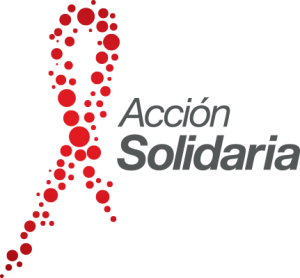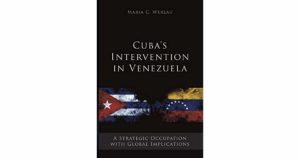
Accion Solidaria
Hundreds of representatives from governments, agencies and charity groups are gathering in Brussels for a “solidarity conference” to drum up support for millions of Venezuelans who have fled the political crisis and particularly neighboring countries that are taking them in, AP reports:
Around 4.5 million people have fled and numbers could soon surpass the 5.6 million who have left conflict-ravaged Syria since 2011 if departures continue at the same rate. Most Venezuelans have remained in Latin America or the Caribbean, weighing heavily on their economies.
The U.S. Department of Transportation announced Friday that there will be a ban on flights to Cuba outside of Havana beginning December 10, VOA reports. The ban is an attempt to limit cash flow to the Cuban government. The United States has been increasing sanctions on Cuba due to the repression of its citizens and the government’s support for Maduro, according to the Miami Herald and NBC (HT: Cipher Brief).
 A politically diverse range of island-based opposition groups has joined with the Inspire America Foundation to adopt the “Agreement for Democracy”, a common position on transition, at an event held at Miami Dade College with Luis Almagro, Secretary General of the OAS, and Carrie Filipetti, Deputy Assistant Secretary for Cuba and Venezuela, reports suggest:
A politically diverse range of island-based opposition groups has joined with the Inspire America Foundation to adopt the “Agreement for Democracy”, a common position on transition, at an event held at Miami Dade College with Luis Almagro, Secretary General of the OAS, and Carrie Filipetti, Deputy Assistant Secretary for Cuba and Venezuela, reports suggest:
The Agreement for Democracy has existed since 1998 and sets forth principles we and a number of groups have long held and advocated and which now, an increasing number of organizations are adopting….Last month the Inspire America Foundation brought the Czech Foreign Minister to Miami to launch The Initiative for Democratic and Economic Alternatives (IDEAs) for Cuba in association with FIU and Columbia University. IDEAs is set to begin working on recommendations for a transition that are consistent with the Agreement for Democracy.*
According to The Miami Herald, during an official state visit to Ireland Cuban President Miguel Díaz-Canel claimed at a gathering with Cubans on October 21, 2019 that “what happens is that there are Cubans who have excluded themselves… In Cuba, everyone is not revolutionary, nor is everyone with the revolution, and nobody is persecuted for being with the revolution or not.”
At the same time that he said this, the Castro regime was persecuting dissidents, the Center for a Free Cuba adds.
 It has only recently become clear to analysts in the United States that Russia is playing a big role in Latin America to destabilize Washington’s alliance system and threaten US interests, notes analyst Stephen Blank. Despite the costs involved in sustaining Cuba, Venezuela and Nicaragua, Russia’s three main “proxies” in Latin America, President Vladimir Putin—like his Soviet predecessors—seems willing to bear those expenditures, he writes for the Jamestown Foundation:
It has only recently become clear to analysts in the United States that Russia is playing a big role in Latin America to destabilize Washington’s alliance system and threaten US interests, notes analyst Stephen Blank. Despite the costs involved in sustaining Cuba, Venezuela and Nicaragua, Russia’s three main “proxies” in Latin America, President Vladimir Putin—like his Soviet predecessors—seems willing to bear those expenditures, he writes for the Jamestown Foundation:
The benefits to Moscow come in other forms. For instance, while Moscow has stepped away from pressing Caracas to pay its debts, Russian state-owned oil giant Rosneft has been granted ever greater access to Venezuela’s oil and natural gas sector. In exchange for a debt write-off Venezuelan state-run oil firm Petroleos de Venezuela (PDVSA) reportedly could be handed over entirely to Rosneft (TASS, October 16). In addition, Foreign Minister Sergei Lavrov has characterized Venezuela—as well as Cuba and Latin America more generally—as poster children of sorts for his regular fulminations against Washington’s supposed efforts to destabilize the global order (Mid.ru, October 3).
 Venezuela’s Permanent Representative to the Organization of American States Ambassador Gustavo Tarre and U.S. Permanent Representative to the Organization of American States Ambassador Carlos Trujillo invite you to the presentation and discussion of the book Cuba’s intervention in Venezuela: a strategic occupation with global implications by Maria Werlau with a discussion led by Tom Gjelten, author of Bacardi and the Long Fight for Cuba and reporter at National Public Radio.
Venezuela’s Permanent Representative to the Organization of American States Ambassador Gustavo Tarre and U.S. Permanent Representative to the Organization of American States Ambassador Carlos Trujillo invite you to the presentation and discussion of the book Cuba’s intervention in Venezuela: a strategic occupation with global implications by Maria Werlau with a discussion led by Tom Gjelten, author of Bacardi and the Long Fight for Cuba and reporter at National Public Radio.
Thursday, November 7th, 2019 3:00 – 4:30 p.m.
Columbus Memorial Library,19th Street and Constitution Avenue, N.W., Washington, D.C. 20006. Open to the public but capacity is limited.
RSVP: E-mail USMissionRSVP@gmail.com
* Full Text of the Agreement for Democracy’s ten points (in English):
Full Text of the Agreement for Democracy’s ten points (in English):
- Guarantee the people’s participation in the decisions of the nation through the exercise of universal, direct, and secret voting to elect its representatives, and the right to seek public office.
- Immediately issue a general amnesty for the liberation of all political prisoners, including those who have been sentenced for fictitious common crimes, and cancel the pending political causes against Cubans in exile, so as to facilitate their return to the homeland and their reintegration into the national society.
- Organize an independent, impartial and professional judiciary.
- Recognize and protect the freedom of expression, of the press, of association, of assembly, of peaceful demonstration, profession and religion.
- Protect the Cuban people from arbitrary expulsion from their homes as well as against all forms of detention, search, confiscation or arbitrary aggression, and from violation of their correspondence, documents and other communications, and defend all Cubans’ right to privacy and honor.
- Immediately legalize all political parties and other organizations and activities of civil society.
- Refer to the Constitution of 1940, when applicable, during the transition period and convoke free elections with the supervision of international organizations within a time period not greater than one year, for a Constituent Congress which will establish a Constitution and which, during its existence, shall have authority to legislate as well as to oversee the executive. Having thus achieved democratic legitimacy, it shall call general elections in accordance with the provisions of the Constitution.
- Recognize and protect the freedom of economic activity; the right to private property; the right to unionize, to bargain collectively and to strike; the Cuban people’s right to genuine participation in their economic development; access to public health and education, and initiate the reestablishment of civic values in education.
- Take immediate steps to protect Cuba’s environmental security and protect and rescue the national patrimony.
- Propitiate and guarantee the professionalism and political neutrality of the Armed Forces and create forces of public order whose rules of conduct shall adjust to the principles of this Agreement.







